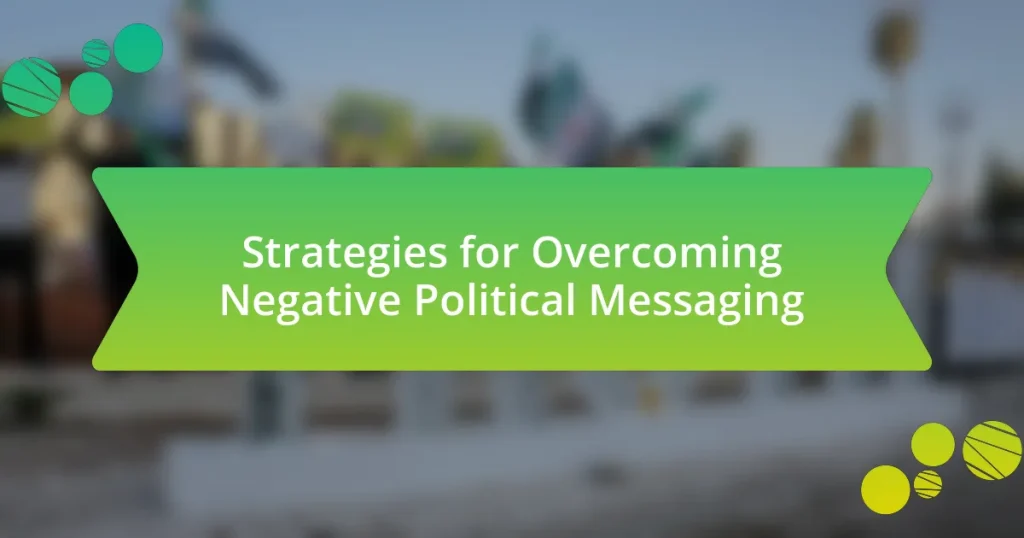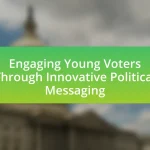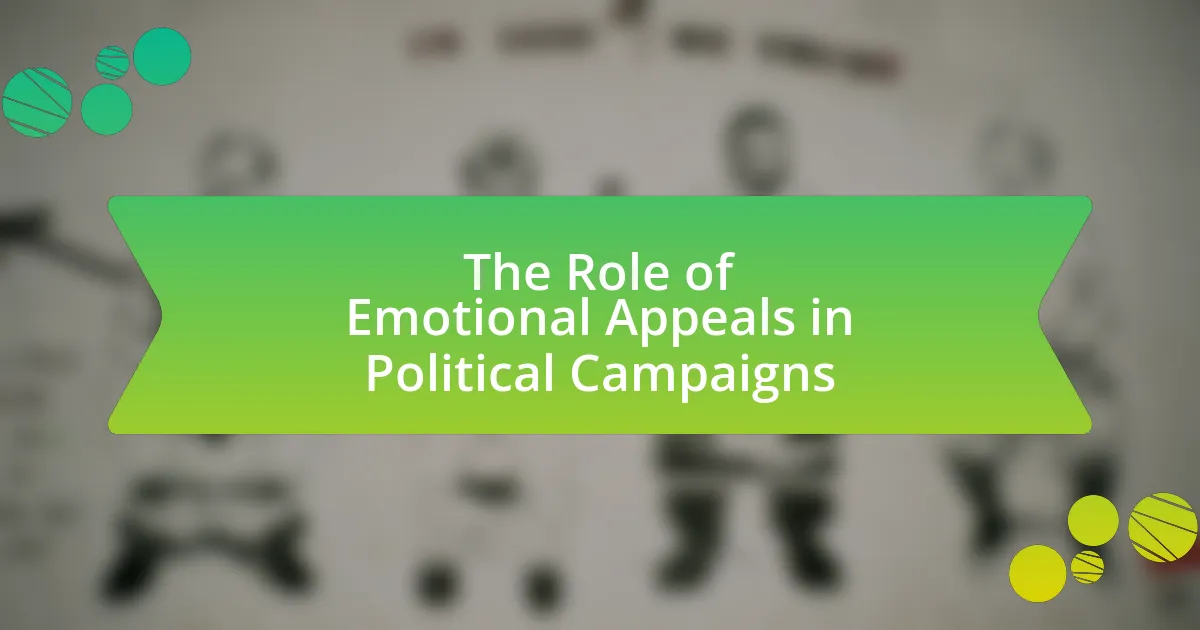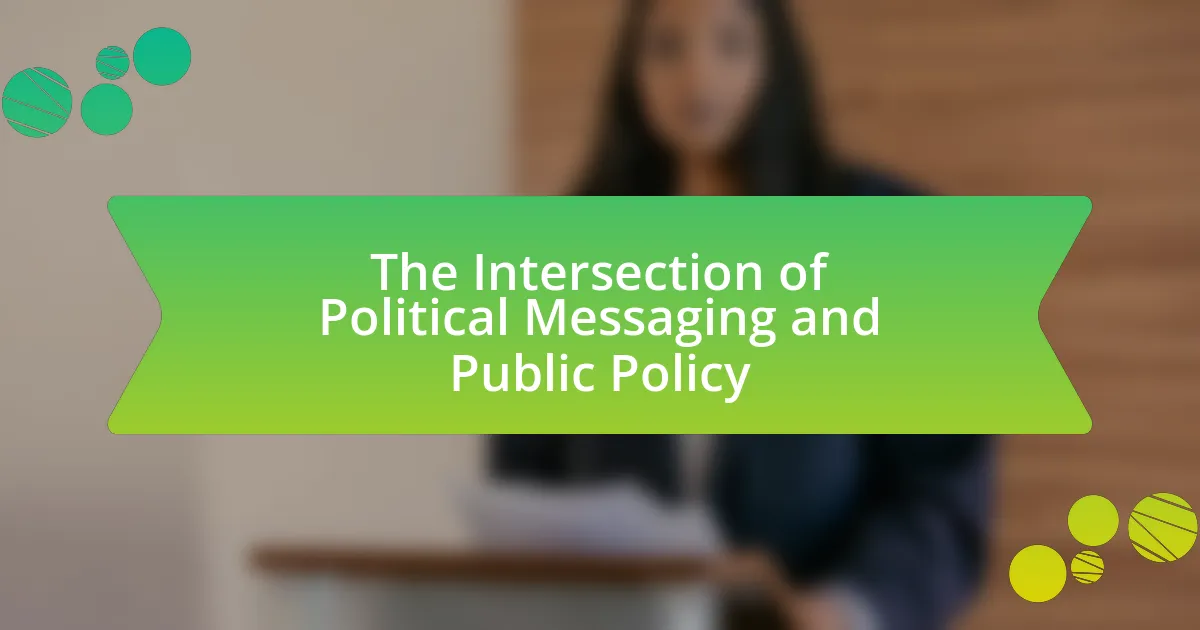The article focuses on strategies for overcoming negative political messaging, highlighting the key challenges associated with such tactics, including voter backlash, alienation of undecided constituents, and the reinforcement of negative perceptions. It examines the impact of negative messaging on public perception, voter turnout, and the psychological effects on individuals, emphasizing the importance of addressing these issues to foster a healthier political discourse. The article also outlines effective strategies such as fact-checking, promoting positive narratives, and enhancing media literacy to counteract negativity, ultimately advocating for constructive communication and engagement in political discussions.
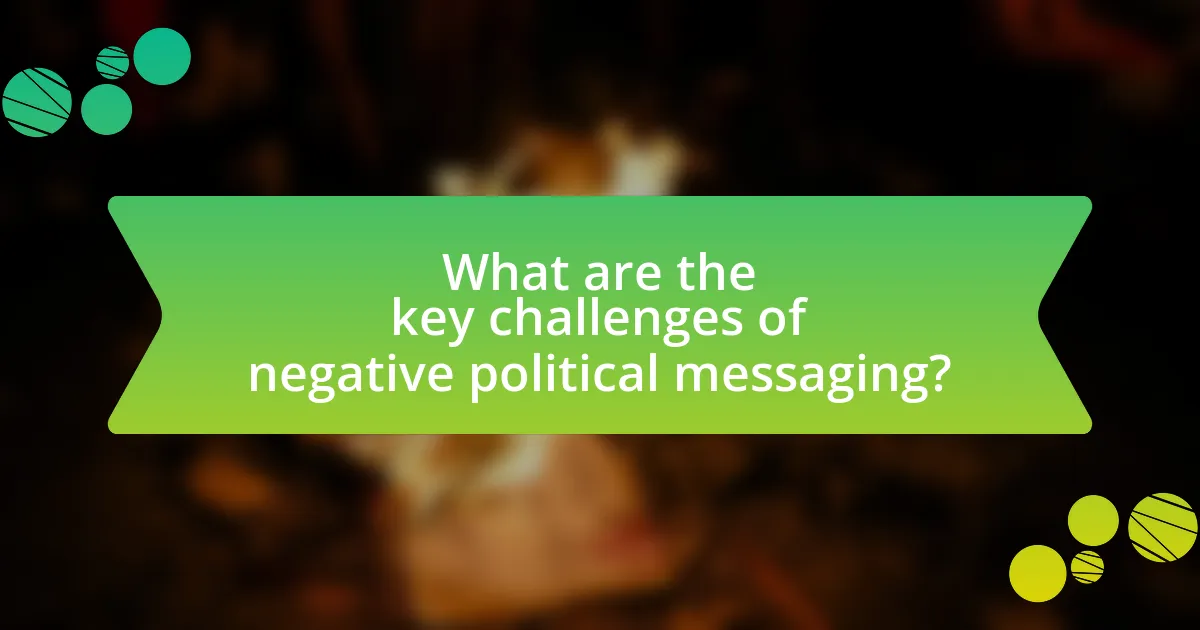
What are the key challenges of negative political messaging?
The key challenges of negative political messaging include potential backlash from voters, the risk of alienating undecided constituents, and the possibility of reinforcing negative perceptions of the political party or candidate. Negative messaging can lead to voter fatigue, where audiences become desensitized to attacks and disengage from the political process. Additionally, research indicates that negative campaigns can inadvertently strengthen the opponent’s support, as seen in the 2004 U.S. presidential election, where negative ads against George W. Bush helped solidify his base. Furthermore, negative messaging often lacks specificity, which can result in confusion and misinterpretation among the electorate, ultimately undermining the intended impact of the campaign.
How does negative political messaging impact public perception?
Negative political messaging significantly influences public perception by fostering distrust and polarization among voters. Research indicates that exposure to negative campaign ads can lead to increased cynicism towards political figures and institutions, as evidenced by a study from the University of California, which found that negative ads can decrease voter turnout by up to 10%. This decline in engagement often stems from the perception that all candidates are untrustworthy, thereby diminishing the overall political discourse. Furthermore, negative messaging can reinforce existing biases, leading to a more divided electorate, as shown in a study published in the Journal of Politics, which highlights how negative framing can solidify partisan identities.
What psychological effects does negative messaging have on voters?
Negative messaging significantly impacts voters by inducing feelings of fear, anxiety, and distrust. Research indicates that exposure to negative political advertisements can lead to increased voter apathy and lower turnout rates, as individuals may feel overwhelmed or disillusioned by the negativity. A study by the American Psychological Association found that negative campaigning can create a sense of helplessness among voters, which diminishes their motivation to participate in the electoral process. Furthermore, negative messaging can polarize opinions, leading to stronger in-group and out-group biases, which can further entrench divisions within the electorate.
How does negative messaging influence voter turnout?
Negative messaging typically decreases voter turnout by fostering apathy and discouragement among potential voters. Research indicates that when campaigns focus on negative aspects of opponents rather than positive attributes of candidates, it can lead to voter disillusionment. For instance, a study by the Pew Research Center found that negative political ads can create a sense of hopelessness, causing individuals to feel that their vote will not make a difference. This emotional response often results in lower engagement and participation in elections.
Why is it important to address negative political messaging?
Addressing negative political messaging is crucial because it can significantly influence public perception and voter behavior. Negative messaging often spreads misinformation, fosters division, and undermines trust in political institutions. Research indicates that exposure to negative political ads can lead to increased cynicism and disengagement among voters, as shown in studies by the Pew Research Center, which found that 70% of Americans believe negative campaigning is harmful to democracy. By countering such messaging, political entities can promote a more informed electorate and encourage constructive dialogue, ultimately strengthening democratic processes.
What are the long-term consequences of ignoring negative messaging?
Ignoring negative messaging can lead to a range of long-term consequences, including desensitization to harmful rhetoric, erosion of critical thinking skills, and increased polarization within society. When individuals consistently overlook negative messages, they may become numb to the impact of such communications, reducing their ability to recognize and respond to harmful narratives. Research indicates that prolonged exposure to negative messaging without critical engagement can diminish analytical skills, as individuals may fail to question the validity of information presented to them. Furthermore, ignoring negative messaging can contribute to societal divisions, as groups may become entrenched in their beliefs, leading to a lack of constructive dialogue and increased conflict. Studies have shown that communities that engage with diverse viewpoints are more resilient to polarization, highlighting the importance of addressing negative messaging rather than ignoring it.
How can addressing negative messaging improve political discourse?
Addressing negative messaging can improve political discourse by fostering a more constructive and respectful dialogue among participants. When negative messaging is confronted, it encourages individuals to focus on issues rather than personal attacks, leading to a more informed and engaged electorate. Research indicates that political discussions characterized by positivity and respect can enhance mutual understanding and reduce polarization, as evidenced by studies showing that constructive communication leads to better outcomes in civic engagement and collaboration. For instance, a study published in the Journal of Communication found that positive framing of political messages significantly increased participants’ willingness to engage in discussions about contentious issues.
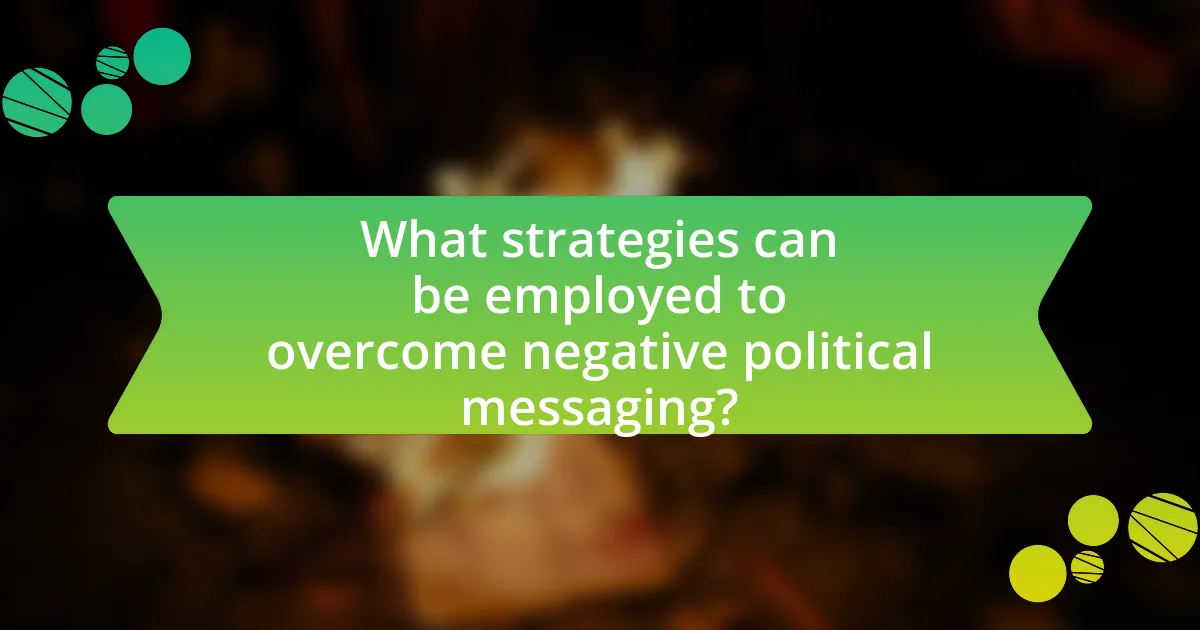
What strategies can be employed to overcome negative political messaging?
To overcome negative political messaging, employing fact-checking and promoting positive narratives are effective strategies. Fact-checking helps to counter misinformation by providing accurate information, which can diminish the impact of false claims. For instance, organizations like PolitiFact and FactCheck.org have successfully debunked misleading political statements, thereby informing the public and reducing the spread of negativity. Additionally, promoting positive narratives focuses on constructive messages and solutions rather than solely attacking opponents. Research indicates that campaigns emphasizing positive messaging can lead to increased voter engagement and support, as seen in the 2008 Obama campaign, which effectively highlighted hope and change. These strategies, when implemented, can significantly mitigate the effects of negative political messaging.
How can positive messaging counteract negativity?
Positive messaging can counteract negativity by promoting constructive dialogue and fostering a sense of community. Research indicates that positive communication can reduce anxiety and defensiveness, making individuals more receptive to new ideas. For instance, a study published in the Journal of Communication found that messages framed positively can enhance audience engagement and reduce polarization in political discussions. By emphasizing shared values and solutions rather than focusing on divisive issues, positive messaging creates an environment conducive to collaboration and understanding, effectively diminishing the impact of negative rhetoric.
What techniques can be used to craft positive political messages?
Techniques to craft positive political messages include using optimistic language, focusing on solutions rather than problems, and highlighting shared values. Optimistic language fosters a sense of hope and encourages engagement, while solution-oriented messaging demonstrates proactive leadership. Emphasizing shared values helps to unite diverse audiences around common goals. Research indicates that messages framed positively can increase public support; for instance, a study by the Pew Research Center found that positive messaging significantly enhances voter perception and engagement.
How can storytelling be utilized to enhance positive messaging?
Storytelling can enhance positive messaging by creating emotional connections that resonate with audiences. This technique allows communicators to present complex ideas in relatable narratives, making the message more memorable and impactful. Research indicates that stories activate the brain’s mirror neurons, which can lead to increased empathy and understanding among listeners. For instance, a study published in the journal “Psychological Science” found that narratives can significantly influence attitudes and behaviors, demonstrating that well-crafted stories can effectively counter negative messaging by fostering a sense of community and shared values.
What role does media play in overcoming negative political messaging?
Media plays a crucial role in overcoming negative political messaging by providing platforms for counter-narratives and fact-checking. Through investigative journalism and balanced reporting, media can expose misinformation and highlight positive stories that challenge negative portrayals. For instance, studies have shown that media coverage can significantly influence public perception; a 2018 Pew Research Center report indicated that 62% of Americans believe that news media helps them understand political issues better. By amplifying diverse voices and fostering informed discussions, media serves as a vital tool in mitigating the impact of negative political messaging.
How can media literacy be promoted to combat negative messaging?
Media literacy can be promoted to combat negative messaging through educational programs that teach critical thinking and analysis of media content. These programs can be integrated into school curricula, focusing on skills such as identifying bias, understanding persuasive techniques, and evaluating sources for credibility. Research indicates that media literacy education can significantly enhance individuals’ ability to discern misinformation; for instance, a study by the Stanford History Education Group found that students who received media literacy training were better at identifying fake news compared to those who did not. By fostering these skills, individuals become more equipped to challenge and resist negative messaging in political contexts.
What strategies can political campaigns use to engage with media effectively?
Political campaigns can engage with media effectively by utilizing targeted messaging, establishing strong relationships with journalists, and leveraging social media platforms. Targeted messaging ensures that the campaign’s core messages resonate with specific demographics, increasing the likelihood of media coverage. Establishing strong relationships with journalists fosters trust and encourages more favorable reporting, as seen in successful campaigns that prioritize media outreach and transparency. Additionally, leveraging social media platforms allows campaigns to directly communicate with voters and counter negative narratives in real-time, as evidenced by the significant engagement rates observed during the 2020 U.S. presidential election, where candidates effectively used platforms like Twitter and Facebook to shape public discourse.
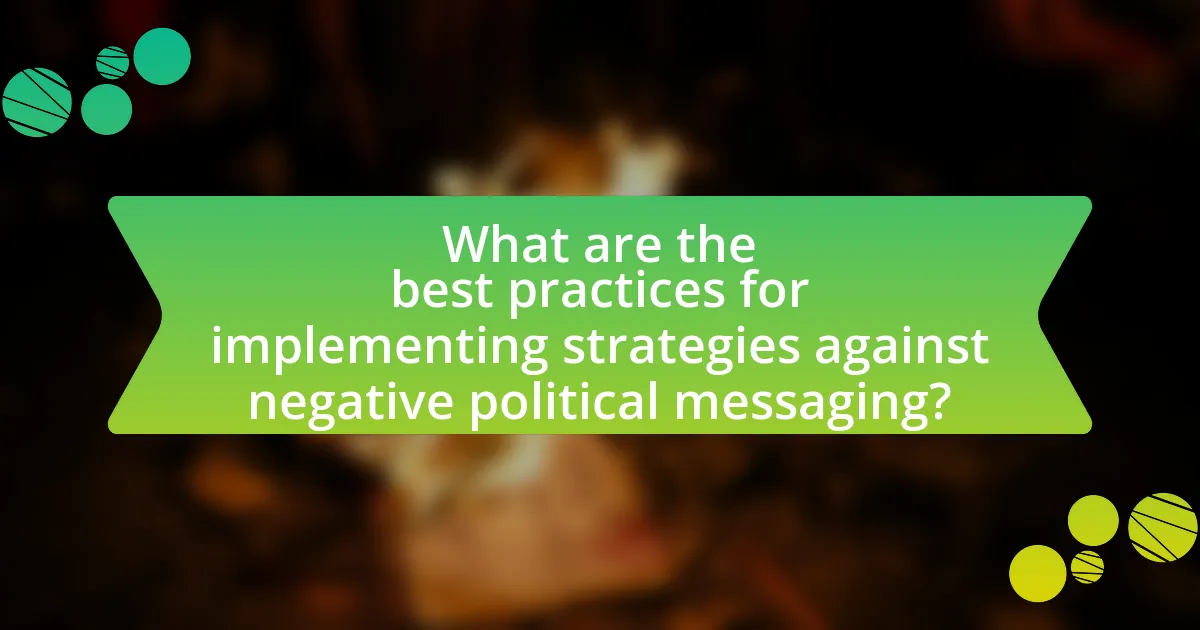
What are the best practices for implementing strategies against negative political messaging?
The best practices for implementing strategies against negative political messaging include proactive communication, fact-checking, and audience engagement. Proactive communication involves consistently sharing positive narratives and achievements to counteract negative messages. Fact-checking is essential to debunk misinformation quickly, as studies show that timely corrections can significantly reduce the impact of false claims. Engaging with the audience through transparent dialogue fosters trust and allows for addressing concerns directly, which has been shown to mitigate the effects of negative messaging.
How can political organizations train their members to respond to negativity?
Political organizations can train their members to respond to negativity by implementing structured communication workshops that focus on emotional intelligence and conflict resolution. These workshops can teach members how to recognize negative messaging, manage their emotional responses, and engage constructively with dissenting opinions. Research indicates that training in emotional intelligence can enhance interpersonal skills and improve responses to negativity, as evidenced by a study published in the Journal of Applied Psychology, which found that individuals with higher emotional intelligence are better equipped to handle conflict and criticism. By incorporating role-playing scenarios and real-life case studies, organizations can provide practical experience that reinforces these skills, ultimately fostering a more resilient and effective membership.
What resources are available for training on effective communication?
Resources available for training on effective communication include workshops, online courses, and books specifically designed to enhance communication skills. For instance, organizations like Toastmasters International offer structured programs that focus on public speaking and leadership skills, which are essential for effective communication. Additionally, platforms such as Coursera and Udemy provide a variety of online courses on communication strategies, often developed by universities and industry experts. Books like “Crucial Conversations” by Patterson, Grenny, McMillan, and Switzler offer practical insights and techniques for improving interpersonal communication. These resources are widely recognized for their effectiveness in teaching communication skills, making them valuable for individuals seeking to overcome negative political messaging.
How can role-playing scenarios help in preparing responses?
Role-playing scenarios can significantly enhance the preparation of responses by simulating real-life interactions and challenges. These scenarios allow individuals to practice articulating their thoughts and strategies in a controlled environment, which builds confidence and improves communication skills. Research indicates that experiential learning, such as role-playing, leads to better retention of information and skills, as participants actively engage with the material rather than passively absorbing it. For instance, a study published in the “Journal of Political Communication” found that participants who engaged in role-playing exercises were 30% more effective in responding to negative political messaging compared to those who did not. This evidence underscores the effectiveness of role-playing as a tool for developing nuanced and effective responses in high-pressure situations.
What are some practical tips for individuals to counter negative messaging?
Individuals can counter negative messaging by actively engaging in critical thinking and seeking diverse perspectives. This approach allows individuals to analyze the validity of the messages they encounter and understand the broader context. Research indicates that exposure to a variety of viewpoints can reduce the impact of negative messaging, as it fosters a more nuanced understanding of issues (Pew Research Center, 2020). Additionally, individuals should practice mindfulness techniques, such as meditation or journaling, to manage emotional responses to negative messages, which can help maintain a balanced perspective. Engaging in constructive dialogue with others can also reinforce positive messaging and diminish the influence of negativity.
How can individuals engage in constructive conversations about politics?
Individuals can engage in constructive conversations about politics by actively listening, asking open-ended questions, and focusing on shared values. Active listening allows individuals to understand different perspectives, while open-ended questions encourage deeper dialogue rather than simple agreement or disagreement. Focusing on shared values helps to create common ground, which can lead to more productive discussions. Research indicates that conversations framed around shared interests can reduce polarization and foster collaboration, as demonstrated in studies by the Pew Research Center, which found that individuals who engage in value-based discussions are more likely to find commonality despite differing political views.
What actions can individuals take to promote positive political engagement?
Individuals can promote positive political engagement by actively participating in community discussions and initiatives. Engaging in local forums, town hall meetings, and civic organizations allows individuals to voice their opinions and collaborate with others on community issues. Research indicates that communities with higher levels of civic engagement experience improved trust in government and increased voter turnout, as seen in studies conducted by the National Civic League. Additionally, individuals can utilize social media platforms to share constructive political content, fostering informed discussions and countering negative messaging. By prioritizing respectful dialogue and focusing on solutions rather than division, individuals contribute to a healthier political environment.
